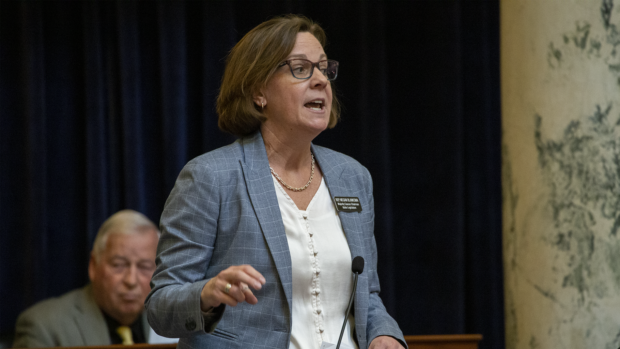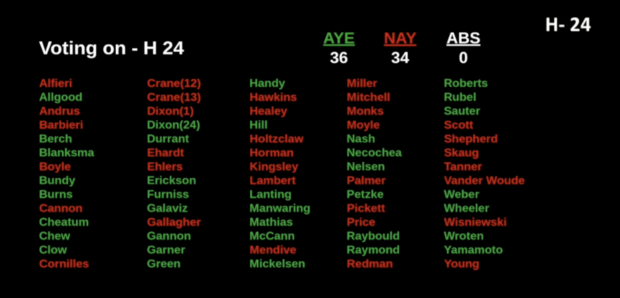A postsecondary student incentives bill passed the House by the narrowest of margins Monday.
And after Monday’s 36-34 vote, Gov. Brad Little’s “Idaho Launch” plan goes to the Senate — where it is also likely to run into resistance.
House Bill 24 would provide high school graduates with up to $8,500 to pursue in-demand careers. They could put the money toward a two- or four-year degree — or a career-technical certificate or workforce training, for young adults who aren’t interested in college.

“(It) targets those kids who have never been helped before,” said House Majority Leader Megan Blanksma, R-Hammett, the bill’s floor sponsor.
Monday’s debate was long — and sharply divided. Over the course of more than two hours, 33 of the House’s 70 members debated the bill.
Supporters said the bill would address a key obstacle to a postsecondary education: affordability.
Rep. Matthew Bundy, a high school teacher, says he often runs into his former students, asking them what they are doing. Some students are pursuing their goals from high school. Others have gotten off track, largely because of finances.
“This program is going to allow us …. to help these folks achieve their dreams,” said Bundy, R-Mountain Home.
Critics raised several concerns:
- They predicted the program and the pricetag will inevitably swell, beyond the $102 million plan laid out in HB 24. “Once you start it, we’re never going back,” said Rep. Brent Crane, R-Nampa. “It will be a disaster for this state long-term.”
- They were uneasy with giving the state’s Workforce Development Council the annual job of determining in-demand careers — programs that would be eligible for an $8,500 incentive. Rep. Jason Monks, R-Meridian, said the state would take on the role of picking economic winners and losers, as it did during the height of the COVID-19 pandemic. “That’s what we’re doing again. These jobs are essential. These jobs are not.”
- They said the bill would not solve the state’s labor shortages — especially since young adults could take their new job skills elsewhere. “There’s nothing in this that’s going to keep people in Idaho,” said Rep. Mike Kingsley, R-Lewiston.
HB 24 is a centerpiece of Little’s education agenda for 2023 — and his plan for the $410 million in new education spending approved during a one-day special legislative session in September.
The bulk of the money for HB 24 would come from an $80 million fund to address in-demand careers, one of two education line items to come out of the special session. (The balance of the costs for HB 24 would come from a phaseout of existing college scholarships, including the state’s Opportunity Scholarship.)
So Monday provided the House with its first chance to vote on how to spend the new $410 million — earmarked without any kind of policy attached to it. “That’s why we are in this bit of a conundrum,” Blanksma said. “We’re sitting in an unusual situation.”
 The bill split the House GOP caucus, with 34 of the chamber’s 59 Republicans voting against Little’s bill. All 11 House Democrats supported the bill; minutes after Monday’s vote, legislative Democrats issued a news release saying they had “saved” the Idaho Launch program.
The bill split the House GOP caucus, with 34 of the chamber’s 59 Republicans voting against Little’s bill. All 11 House Democrats supported the bill; minutes after Monday’s vote, legislative Democrats issued a news release saying they had “saved” the Idaho Launch program.
But Idaho Launch’s future is far from assured.
The bill now is likely to go to the Senate Education Committee. Four of the committee’s nine members are already on record in opposition to HB 24; they are members of the Legislature’s Idaho Freedom Caucus, which issued a news release Sunday condemning the proposal as “nothing but corporate welfare, central planning and socialism.”
Financial literacy bill introduced
A bill that would require financial literacy classes for high school students — a top priority for state superintendent Debbie Critchfield — cleared its first hurdle Monday morning.
Rep. James Petzke, R-Meridian, introduced the legislation before the House Education Committee, outlining the journey of an average high school student into adult decision-making.
After graduating, most young adults start buying groceries, paying rent, taking out loans, paying taxes and applying for credit cards for the first time. “They’ll be making some of the most consequential financial decisions of their lives at 18 years old,” Petzke said.
But most of them, he told the committee, lack the knowledge they need to navigate those processes.
Under the legislation, all districts and public charter schools serving grades 9-12 would be required to teach at least one financial literacy class, with the goal of better preparing students for life after high school. Students would learn about bank accounts, investment, credit and loans, insurance, the tax system, budgeting and other financial skills.
And the legislation aligns with the state superintendent’s goal to make financial literacy a graduation requirement — something she campaigned on. Critchfield attended Monday morning’s meeting.
The committee sent the bill to print with a unanimous vote. A hearing will be scheduled for a later date.
Public radio director gets some static in Senate Education
Boise State Public Radio’s general manager fielded a couple of pointed questions Monday afternoon, after a brief presentation in the Senate Education Committee.
After complaining about programming that he said was “pro-COVID,” pro-pharmaceuticals and pro-lockdown, Sen. Scott Herndon objected to the way lawmakers have been labeled in public radio reports. He twice requested that public radio refrain from describing Senate Education members as “far right.”
“Honestly that creates a presuppositional wall,” said Herndon, R-Sagle.
“I’ll be happy to pass along those comments,” said BSPR general manager Tom Michael, who added that he respects the BSPR’s editorial staff and media partners. (Disclosure: Idaho Education News reporters are frequent guests on BSPR.)
BSPR receives $395,000 in state funding. The balance of its $6 million budget comes from grants and gifts.
